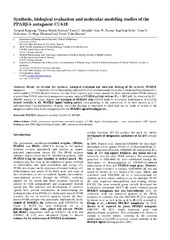Blar i forfatter "Thoresen, G. Hege"
-
Identification of potential carcinogenic and chemopreventive effects of prescription drugs: A protocol for a Norwegian registry-based study
Kulle, Bettina; Støer, Nathalie Charlotte; Martinsen, Jan Ivar; Ursin, Giske; Weiderpass, Elisabete; Thoresen, G. Hege; Debernard, Karen A. Boldingh; Karlstad, Øystein; Pottegard, Anton; Friis, Søren (Journal article; Tidsskriftartikkel; Peer reviewed, 2019-04-08)<i>Introduction</i> - Surveillance of unintended effects of pharmaceuticals (pharmacovigilance or drug safety) is crucial, as knowledge of rare or late side effects is limited at the time of the introduction of new medications into the market. Side effects of drugs may involve increased or decreased risk of cancer, but these typically appear after a long induction period. This fact, together with ... -
Synthesis, biological evaluation and molecular modeling studies of the PPARβ/δ antagonist CC618
Kaupang, Åsmund; Paulsen, Steinar Martin; Steindal, Calin Constantin; Ravna, Aina Westrheim; Sylte, Ingebrigt; Halvorsen, Trine Grønhaug; Thoresen, G. Hege; Hansen, Trond Vidar (Journal article; Tidsskriftartikkel; Peer reviewed, 2015-03-05)Abstract: Herein, we describe the synthesis, biological evaluation and molecular docking of the selective PPARb/ d antagonist (4-methyl-2-(4-(trifluoromethyl)phenyl)-N-(2-(5-(trifluoromethyl)-pyridin-2-ylsulfonyl) ethyl)thiazole-5-carboxamide)), CC618. Results from in vitro luciferase reporter gene assays against the three known human PPAR subtypes revealed that CC618 selectively antagonizes ... -
Synthesis, in vitro and in vivo biological evaluation of new oxysterols as modulators of the liver X receptors
Åstrand, Ove Alexander Høgmoen; Viktorsson, Elvar Örn; Kristensen, Aleksander Lim; Ekeberg, Dag; Røberg-Larsen, Hanne; Wilson, Steven Ray Haakon; Gabrielsen, Mari; Sylte, Ingebrigt; Rustan, Arild; Thoresen, G. Hege; Rongved, Pål; Kase, Eili Tranheim (Journal article; Tidsskriftartikkel; Peer reviewed, 2016-07-26)Liver X Receptor (LXR) modulators have shown potential as drugs since they target genes affecting metabolism and fatty acid synthesis. LXR antagonists are of particular interest since they are able to reduce the synthesis of complex fatty acids and glucose uptake. Based on molecular modeling, five new cholesterol mimics were synthesized, where four contained a hydroxyl group in the 22-S-position. ...


 English
English norsk
norsk

